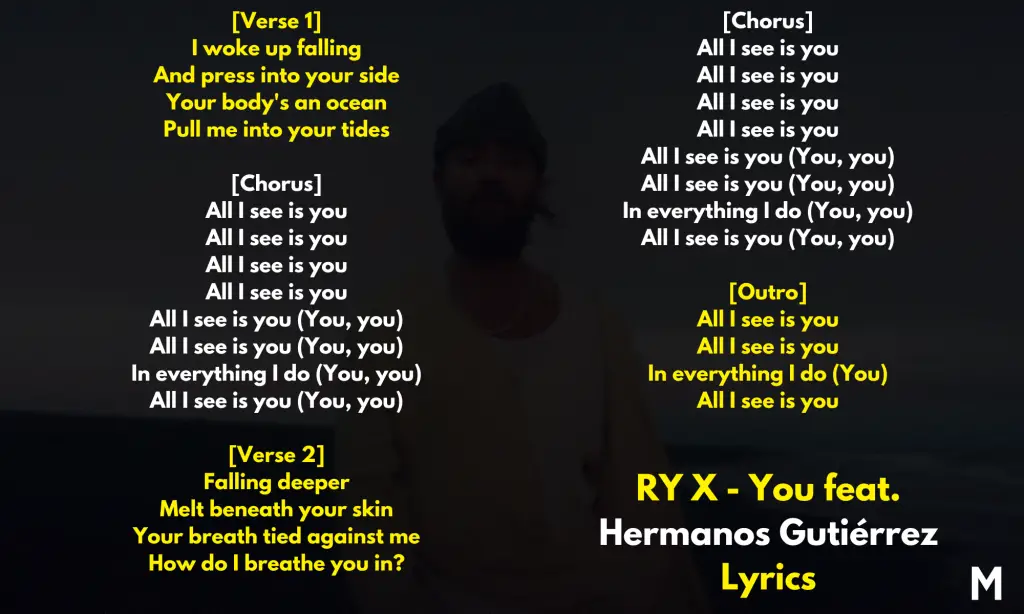Table of Contents
Image C/O RY X & Eden Recordings
When I listen to “You” by RY X with Hermanos Gutiérrez, I’m reminded of how song lyrics can function like poetry—layered with emotion and rich in metaphor and lean into the economy of words to say a lot with only a few phrases and lyrics.
Now, these are just my thoughts on the record, and lyrics can be interpreted in many ways. But in this analysis, I’ll be using my literary perspective and background from the University of Oregon to explore how RY X and Hermanos Gutiérrez bring these themes to life in “You.” My goal is to offer a closer look at how this song reflects deeper emotional undertones, not just through its sound but also through its words.
RY X 2024 North American Live Dates
Oct. 14 – Austin, Texas, USA – Paramount Theatre
Oct. 15 – LA, CA, USA – The Orpheum
Oct. 16 – San Francisco, CA, USA – Grace Cathedral
Oct. 17 – San Francisco, CA, USA – Grace Cathedral
Oct. 18 – Vancouver, Canada – Vogue Theatre
Oct. 19 – Seattle, WA, USA – Saint Mark’s Episcopal Cathedral
Oct. 20 – Portland, OR, USA – Aladdin Theatre
Oct. 22 – Denver, Colorado, USA – Summit
Oct. 23 – Chicago, IL, USA – Park West
Oct. 24 – Toronto, Canada – The Concert Hall
Oct. 26 – Montreal, Canada – MTELUS
Oct. 28 – New York, NY, USA – Warsaw
RY X You Lyrics
RY X You Meaning
Alright, let’s dig into these lyrics together.
From the start, it’s clear that the song explores themes of love, obsession, and total emotional immersion. When you look at the line “All I see is you,” it becomes obvious that the speaker is fully fixated on someone, to the point where this person consumes every thought and action. The whole song builds on that idea, and the way natural imagery—like oceans and tides—is used suggests how powerful and overwhelming this relationship is for the speaker.
I’ve seen these same themes explored in classic poetry by people like Pablo Neruda, John Donne, and Elizabeth Barrett Browning. These poets also unpack ideas on how love can overtake your entire life, so as we break down the lyrics, I’ll show you how these ideas have echoed throughout literature.
Verse 1: The Physical and Emotional Pull of Love
The first verse starts with “I woke up falling / And press into your side,” and right away, I get the sense that the speaker is in a state of emotional surrender. That word “falling” isn’t just physical—it’s emotional. It’s like the speaker is waking up already overwhelmed by this connection. There’s no control here, just a sense of being swept up in something bigger.
To me, this suggests a love that isn’t just about desire—it’s about being completely consumed, almost lost, in someone else. The use of “press into your side” intensifies that feeling. It’s an active need for closeness, for connection, both physically and emotionally.
This immediately brings to mind John Donne’s “The Good-Morrow.” Donne explores this merging of souls, where everything outside of the lover fades away. He writes, “If ever any beauty I did see, / Which I desired, and got, ’twas but a dream of thee.” In both cases—Donne’s poem and these lyrics—the lover becomes the entire world. The focus narrows in so intensely that nothing else seems to matter. And just like Donne, the speaker here finds their emotional and physical world completely tied to this one person.
Next, we get “Your body’s an ocean / Pull me into your tides,” which, for me, really deepens this idea of emotional immersion. The ocean is a perfect metaphor for love because it’s vast, uncontrollable, and full of depth. The “tides” here suggest a natural pull, something the speaker can’t resist even if they tried. This isn’t just affection—it’s surrender. The speaker is being drawn in, almost helpless against the force of this connection.
You can’t control the tides, just like the speaker can’t control their feelings here. This metaphor reminds me of how Donne’s lovers are drawn into each other’s orbits, completely reshaping their emotional worlds.
Chorus: Obsession and Fixation
Now, when the chorus hits—“All I see is you”—it’s hard not to feel the sense of obsession building. The repetition of this line really drives home the idea that the speaker is completely fixated on this person. It’s not just love anymore—it’s all-consuming. It’s like nothing else exists for them, and that’s why the repetition is so effective here. The more it’s repeated, the clearer it becomes that the speaker’s world is shrinking down to this one relationship. Everything else fades into the background.
This reminds me of Pablo Neruda’s “Sonnet XVII,” where Neruda writes, “I love you as certain dark things are to be loved, / in secret, between the shadow and the soul.” In both Neruda’s poem and this chorus, the speaker’s love is almost obsessive, hidden deep inside, taking over everything from within. It’s a kind of love that controls how you see the world—just like the speaker in the song only sees “you.”
That repetition is more than simply a stylistic just but also doubles as a reflection of the speaker’s emotional state, which is completely dominated by this one person.
Verse 2: Surrender and the Desire for Unity
Then we move into the second verse: “Falling deeper / Melt beneath your skin.” To me, this line is a clear sign that the speaker wants more than closeness—they want complete unity. The idea of “melting beneath your skin” suggests a desire to be absorbed into the other person, to lose all sense of self and become one with them. It’s about emotional and physical intimacy taken to its extreme. This isn’t just love anymore—it’s about becoming inseparable from the person they’re in love with.
This reminds me of Elizabeth Barrett Browning’s “Sonnet 43,” where she writes, “I love thee with the breath, / Smiles, tears, of all my life.” Just like in Browning’s sonnet, this song’s speaker is saying their love permeates everything. They want to be so close that they’re not just with the other person—they are the other person, fully merged in every sense. It’s not just a romantic connection—it’s about dissolving those boundaries that separate them.
Then we get “Your breath tied against me / How do I breathe you in?” Breath is a powerful metaphor here. It’s life itself. The speaker’s struggle—“How do I breathe you in?”—feels like they’re grappling with the sheer intensity of the relationship. How do you handle being that close to someone? How do you take in their essence without losing yourself completely? It’s a question that doesn’t seem to have an answer. This kind of longing for unity, for intimacy so deep that you can’t separate one person from the other, is a recurring theme in poetry.
Neruda touches on it, Browning captures it, and here, we see it play out in this intimate, overwhelming moment.
Chorus: Reaffirmation of Obsession
The chorus comes back, and again, we hear “All I see is you.” By this point, it’s clear the speaker’s world revolves entirely around this relationship. The repetition feels even more intense now because we’ve seen just how deep their desire runs. The earlier verses have shown us how much this connection matters, and now the chorus serves to remind us that this obsession is inescapable. The speaker is locked into this cycle of seeing, feeling, and focusing entirely on the person they love.
This idea brings me back to Donne’s “The Good-Morrow.” In that poem, Donne says, “And makes one little room an everywhere.” Just like in Donne’s poem, the speaker in this song finds that their world has become incredibly small—narrowed down to one person. There’s nothing outside of this relationship.
Everything else fades away, and the lover becomes the speaker’s entire reality. It’s a powerful statement about how love, and sometimes obsession, can reshape the way we experience life.
Outro: A Final Declaration of Love’s Dominance
In the outro, we hear “All I see is you / In everything I do,” which feels like the speaker’s final acceptance of their emotional state. At this point, they’ve fully acknowledged that their entire existence is shaped by this person. “In everything I do” is a huge statement—it means that every action, every thought, every part of life is influenced by this one relationship. It’s no longer about just seeing the other person—it’s about living through them, with them as the driving force behind everything.
This reminds me of Browning’s “Sonnet 43” again, where she writes, “I love thee freely, as men strive for Right; / I love thee purely, as they turn from Praise.” Browning’s speaker talks about a love that influences every part of their life, from the biggest decisions to the smallest moments. Similarly, in the song’s outro, the speaker is saying that this love is all-encompassing.
It’s not just something they feel—it’s something that directs their entire existence. In my opinion, this final repetition isn’t just about love—it’s about the total surrender of self to this relationship.
Themes, Meanings, and Main Takeaways
When looking at the themes in “You” by RY X, one of the most striking elements is the focus on emotional immersion and the overpowering nature of love. The speaker is not just in love—they are consumed by it. The repeated line “All I see is you” signals that the subject of their affection has completely overtaken their thoughts, actions, and identity. This feeling of being overwhelmed by love connects directly to Pablo Neruda’s “Sonnet XVII,” where love is described as something dark and secret, something that infiltrates the deepest parts of one’s soul.
Both Neruda’s poem and RY X’s lyrics touch on the idea of love as an uncontrollable force, something that takes root in your life and transforms how you see the world. In both cases, love is not portrayed as a simple emotion but as something far more consuming and complex.
The metaphor of being pulled into tides and the ocean in the lyrics also suggests surrender—a giving up of control to the relationship. This same idea is explored in John Donne’s “The Good-Morrow,” where two lovers merge into a singular existence, their separate worlds fading away as they become one. The speaker in RY X’s song mirrors Donne’s concept of two souls merging, wanting to dissolve the boundaries between themselves and their partner, as shown in lines like “Melt beneath your skin.”
The ocean imagery in the song and Donne’s “one little room an everywhere” both illustrate how love can shrink or expand our perception, narrowing our focus entirely onto the beloved. In both works, love is not just a part of life—it becomes life itself.
Finally, Elizabeth Barrett Browning’s “Sonnet 43” offers a deeper layer of understanding for the themes in “You.” Browning speaks of a love that permeates everything, from “breath” to “tears” and even “smiles,” reflecting the way love colors every part of our existence. In the song, this is captured through the repeated line, “In everything I do.” It shows that the speaker’s love is not confined to specific moments but influences every aspect of their life. Browning’s idea that love exists “freely” and “purely” mirrors the speaker’s acceptance that this emotional surrender is not just inevitable—it’s welcomed.
Both the song and the poem convey the message that love, in its truest form, shapes us entirely, and to love someone deeply means allowing that love to dictate how we move through the world.
The post RY X You Lyrics And Meaning: A Poetic Exploration of Connection and Surrender appeared first on Magnetic Magazine.






